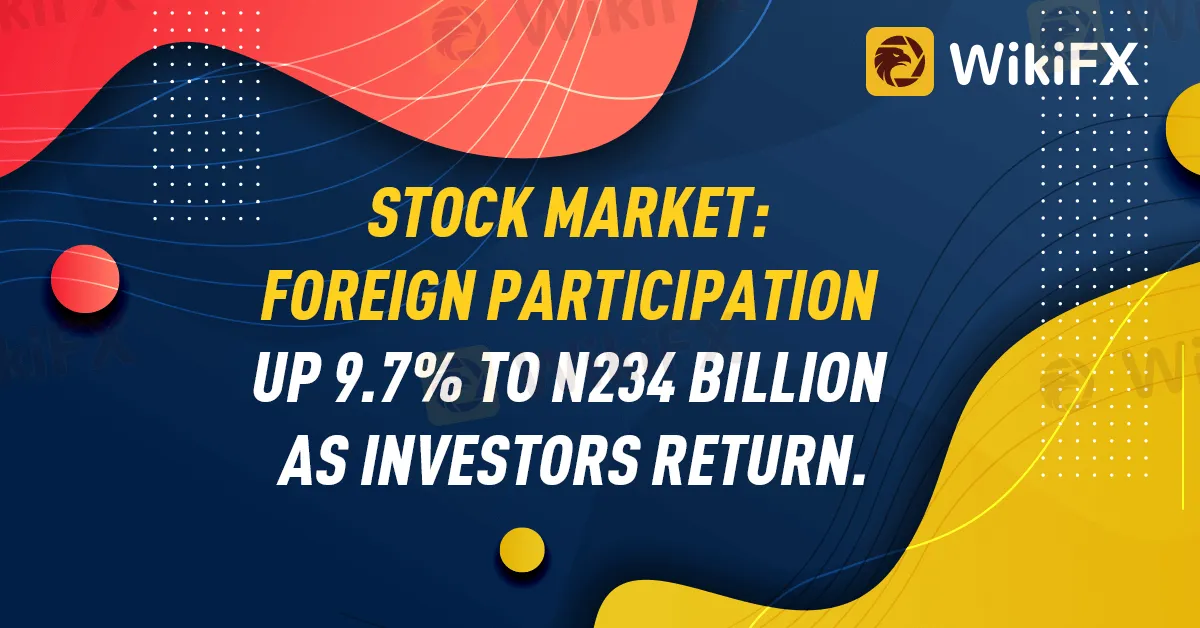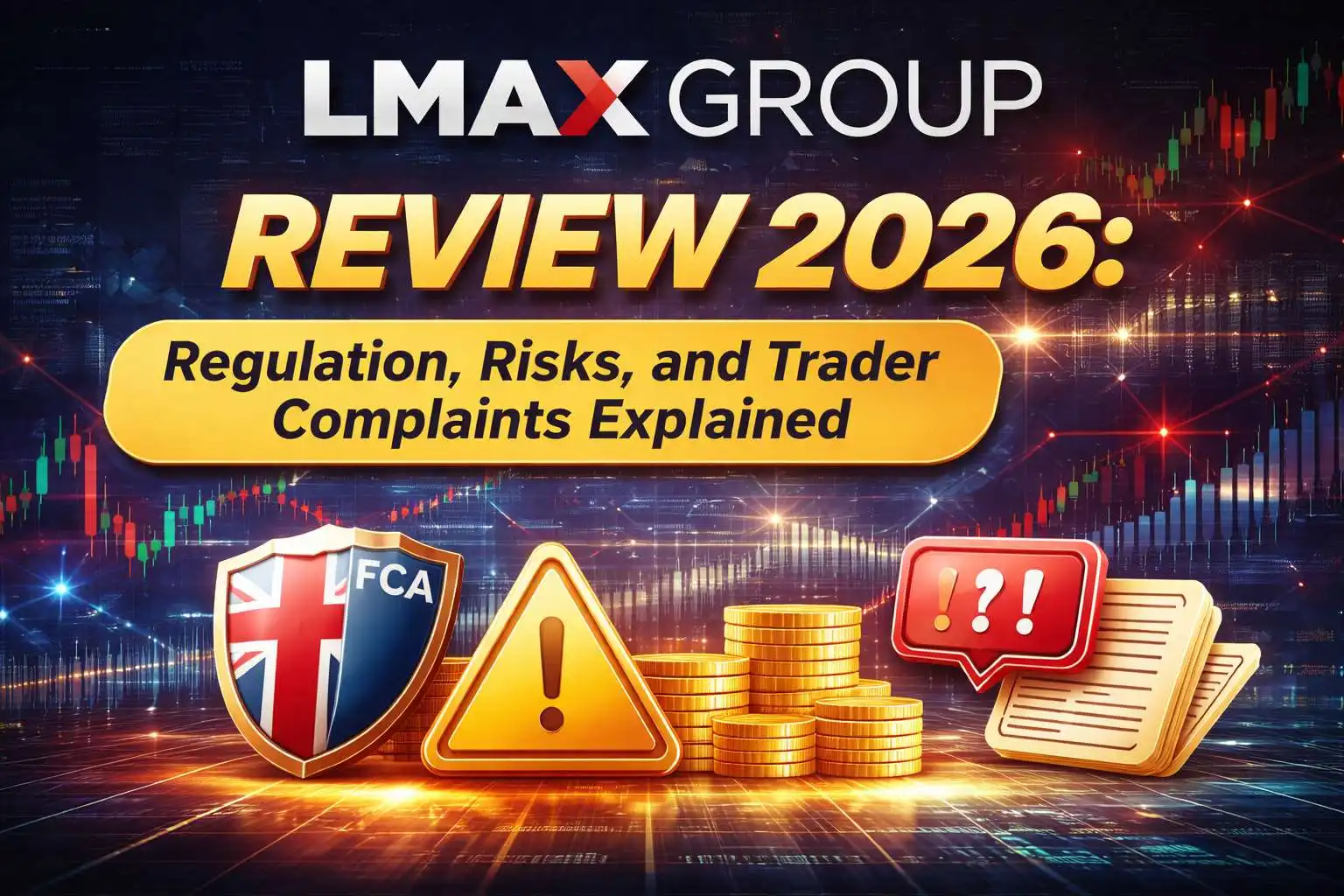LMAX GROUP Review 2026: Regulation, Risks, and Trader Complaints Explained
LMAX GROUP review: FCA regulation, WikiFX score 7.51/10, trader complaints, risks, and broker comparison. Is LMAX GROUP safe for traders?
简体中文
繁體中文
English
Pусский
日本語
ภาษาไทย
Tiếng Việt
Bahasa Indonesia
Español
हिन्दी
Filippiiniläinen
Français
Deutsch
Português
Türkçe
한국어
العربية
Abstract:As the value of foreign portfolio investments, or FPIs, in equities reversed the trend of decline to record N243.48 billion in the first half of 2022, H1'22, an increase of about 9.7% year-over-year, or YoY, from N221.96 billion in the corresponding period of 2021, there are signs that foreign portfolio investors are back to Nigeria's stock market.

As the value of foreign portfolio investments, or FPIs, in equities reversed the trend of decline to record N243.48 billion in the first half of 2022, H1'22, an increase of about 9.7% year-over-year, or YoY, from N221.96 billion in the corresponding period of 2021, there are signs that foreign portfolio investors are back to Nigeria's stock market.
Stock brokers and experts have ascribed the development to the Central Bank of Nigeria's (CBN) expansionary monetary policy regime throughout the majority of the H1'22 as well as the strong performance of the equities market in 2021.
The comeback, however, is not expected to last into the second half of the year, H2'22, according to the experts, since the motivating factors have already changed as a result of the CBN's return to restrictive monetary policy in May 2022.
Analysts believe that another issue that might damage FPI trust is the run-up to the general election in 2023.
While CBN's monetary strategy raises fixed income investments, equity prices have already begun to drop.
In contrast, the contribution of foreign investors to the overall stock market turnover increased by 14.6% in the first half of 2012 compared to the first half of 2011 (21.46%).
According to stock market statistics, FPIs have been steadily declining since 2018, when they reached their peak of N799 billion. To N472.78 billion, it had a staggering fall of 40.9% in 2019.
It fell by 16.1% further to N396.63 billion in 2020 and again by 44.03 percent the following year.
ANALYSTS INSIGHT
Given the fluctuating currency rates and the uncertainties surrounding the repatriation of profits, FPIs' commitment in Nigeria may continue to be on a negative trend.
Additionally, they pointed out that the election in 2023 would result in a further decline in the value of FPIs as foreign investors would flee for safety due to the political unpredictability.
David Adonri, vice executive chairman of Highcap Securities Limited, commented: The strong full year 2021 performance by listed businesses the increase of FPI in H1, 2022. Remember that, the market increased by around 7.0%. However, just in January 2022, stocks rose more than 9% as a consequence of expectations that were exceeded after the entire year's data began to surface.
The dividend payments and the results were encouraging. Several commercial efforts, corporate debt and acquisitions, increased the interest of international investors in Nigerian shares. Last but not least, the rise in crude oil prices during the first quarter of 2022 helped investors and FPI. Regarding the validity of foreign investors' interest in the market, Adonri predicted that the price of crude oil will cease rising in the second half of 2022. When paired with concerns about the sovereign default of the FGN, currency illiquidity, and election fever in 2023, investor confidence is predicted to decline in the second half of 2022.
Furthermore, Cowry Asset Management Limited analysts said: Given that foreign investors no longer actively trade Nigerian stocks, as evidenced by their control of less than 25% of market activity, we believe local institutional investors may be more motivated to remain in the market despite the rate increase announced by the CBN and other central bank chiefs worldwide in July.
Additionally, the release profits for the first half of the year will move forward, creating appealing profit-taking chances for investors.
In response, Mr. Johnson Chukwu, the managing director/CEO of Cowry Asset, said: If you look at the pattern over the last three years, you will note that foreign portfolio investment into the Nigerian stocks market has been falling. Naturally, we are aware of the factors preventing foreign portfolio investment, the pattern persists unless those issues are resolved.
Chukwu said the major thing that drives foreign input into the economy is the liquidity in the FX market. This was in reference to how FX volatility and illiquidity led to the downturn. When they choose to depart, international investors want to be able to change back to their home currencies.
Foreign portfolio investors stay away from the FX market if there is no liquidity. As you are aware, the Nigerian FX market saw the locking of international portfolio investors who liquidated their holdings and desired to escape but were unable to obtain the necessary FX. New investors couldn't enter as a result of those people's inability to depart
The stability or predictability of the currency rate is another aspect that could have an impact on them. However, the FX market's liquidity is the most crucial element.
The First Bank of Nigeria's FBNQuest Merchant Bank's Head of Equity Research, Tunde Abioye, also voiced his opinion, saying: “It's more of a matter of indifference by offshore investors than than greater involvement by domestic investors.” Foreign Portfolio Investments, or FPIs, lost interest due to worries about FX availability and the worsening macroeconomic climate.
Mr. Rotimi Olubi, managing director of Morgan Capital Securities Limited and an economist, commented on the country's FPIs, stating that “the campaigning for the general elections in Nigeria in 2023 will cause Foreign Portfolio Investors (FPIs) to remain on the sidelines and further increase foreign portfolio outflows.”

Disclaimer:
The views in this article only represent the author's personal views, and do not constitute investment advice on this platform. This platform does not guarantee the accuracy, completeness and timeliness of the information in the article, and will not be liable for any loss caused by the use of or reliance on the information in the article.

LMAX GROUP review: FCA regulation, WikiFX score 7.51/10, trader complaints, risks, and broker comparison. Is LMAX GROUP safe for traders?

Is withdrawal issue perennial for Phyntex Markets traders like you? Does the Comoros-based forex broker give you numerous excuses to deny you withdrawals? Faced account blocks when raising Phyntex Markets withdrawal queries? Feel that the broker’s customer support service does not exist for you? Many traders have openly expressed frustration on how the broker goes about its business on review platforms. In this Phyntex Markets review article, we have shared multiple complaints against the broker. Keep reading to know the same.

Have you made multiple unsuccessful attempts to withdraw funds from your Tifia forex trading account? Registered successful trades but could not withdraw because of inadequate customer support service? Have you been facing capital losses due to severe slippage on the Tifia login? These issues have become increasingly common for traders here. Many of them have made such allegations on broker review platforms. In this Tifia review article, we have explored some scam allegations. Take a look!

Is withdrawing capital from PaxForex too difficult for traders? Has the China-based forex broker made you trade gold, silver and cryptocurrencies despite not having an office in the United States? Do you find its operational style suspicious? You are not alone! Several traders have expressed these concerns when trading with the broker. In this PaxForex review article, we have exposed the broker through user comments made on several review platforms. Take a look!
